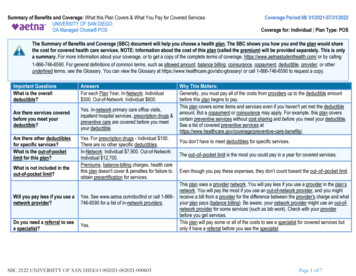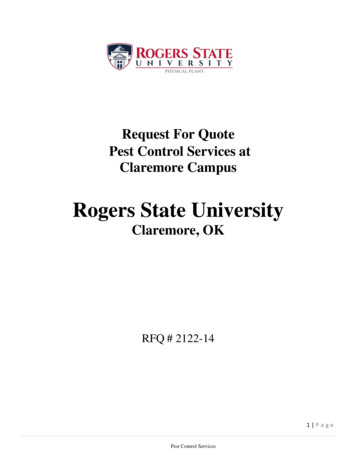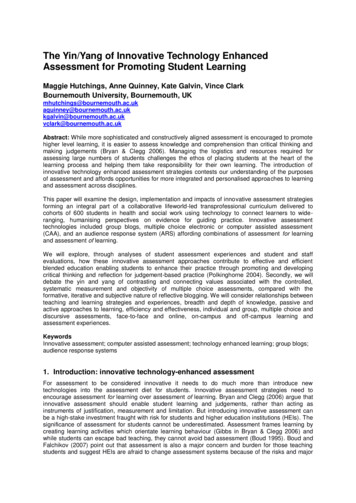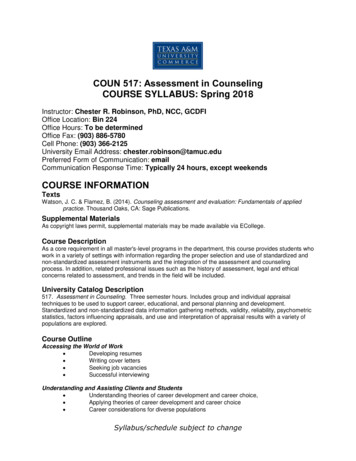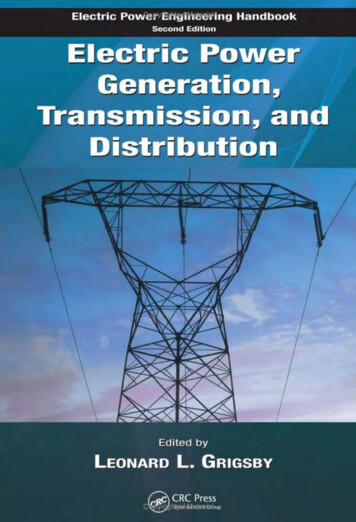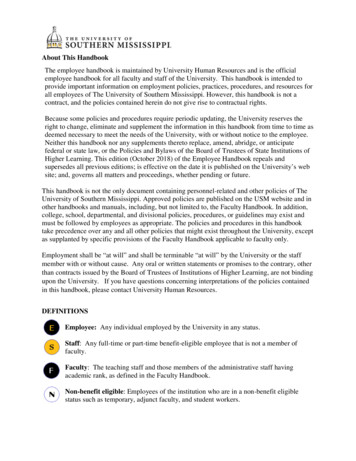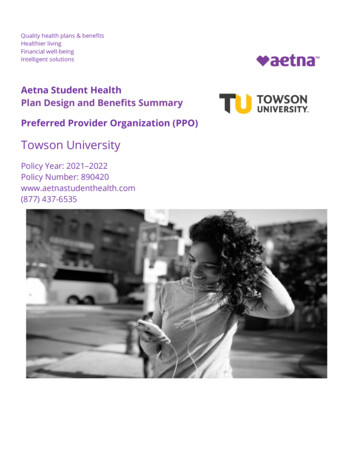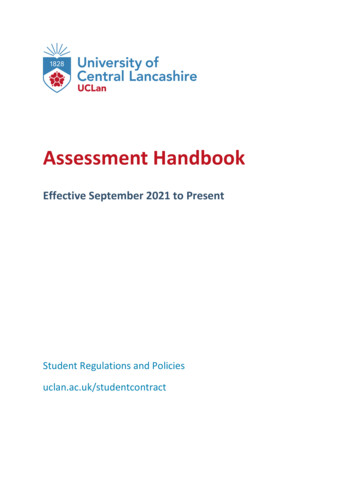
Transcription
Assessment HandbookEffective September 2021 to PresentStudent Regulations and Policiesuclan.ac.uk/studentcontract
Table of Contents12Introduction and Scope (for staff) . 1Assessment principles and procedures for taught programmes (for staff). 22.1Principles of Assessment . 22.2Regulations . 82.3Anonymous Marking . 82.4Use of Turnitin . 92.5Assessment Procedures . 92.6Publication of Examination Arrangements . 122.7Chairing and Secretarial Support of the Assessment Board. 123 Extension requests for taught programmes (for staff and students) . 143.1Policy and Procedures on Extensions . 1443.2Approving Extensions . 15Mitigating Circumstances for Taught Programmes (for staff) . 1554.1Policy and Procedures on Mitigating Circumstances . 15Examination Procedures for Taught Programmes . 1765.1Scope . 175.2Examination Instructions for Invigilators . 175.3Evacuation Procedures . 195.4Examination Instructions for Candidates. 19Academic Integrity Policy and Procedure for Academic Misconduct . 206.1Academic Integrity Policy .206.2Procedure for handing academic misconduct . 226.3Scope . 226.4Principles . 236.5Support for students .236.6Reasonable adjustments. 236.7Identifying Academic Misconduct . 236.8Academic Judgment . 246.9Standard of Proof . 246.10 Poor Academic Practice . 246.11 Definitions of Academic Misconduct .246.12 Role and responsibilities .266.13 Procedure following an allegation of academic misconduct . 266.14 Categories of Academic Misconduct 276.15 Developmental Engagement (category 1) 286.16 Interview with the academic integrity lead (categories 2 and 3) 286.17 Referral to the Academic Misconduct Committee (category 4) .286.18 Penalties for academic misconduct 306.19 Explanatory circumstances .326.20 Appeal .326.21 External review .326.22 Recording and disclosure of information 3276.23 Monitoring and review .32Academic Appeals Procedure . 337.1Scope and Purpose . 33
7.2Principles . 347.3Grounds for Appeal . 347.4Process for Appealing Against Assessment Decisions . 357.5First Stage Appeal . 357.6Second Stage Appeal. 367.7Second Stage Appeal Panel . 367.8Documentation for Second Stage Appeal Panels . 367.9Outcomes . 377.10 Status of a Student during an Appeal . 377.11 Independent Review . 387.12Monitoring and Review .387.13Procedure for Hearing the Second Stage Appeal 38Appendices . 40Appendix 1: Further reading and useful websites (for staff).Appendix 2: Standard Descriptors (for staff) .Appendix 3:Verification and ModerationGuidance Appendix 3a: Exemplar VerificationForm Appendix 3b Exemplar ModerationFormAppendix 4: Form – Moderation Report (for staff).Appendix 5: Online Assessment Policy and Electronic Management of Assessment (EMA) – OnlineSubmission, Marking and Feedback (for staff).Appendix 6: Chair’s Action Forms .Appendix 7: Examination Incident Report Form.Appendix 8: Procedure for Handling Suspected Academic Misconduct during an Examination .Appendix 9: UCLan Coursework Brief template .Appendix 10: Assessment e-coversheet .
1 Introduction and Scope (for staff)1.1.1A review of assessment across the sector by JISC has identified that in many universities, institutionaldocumentation has a focus on procedures rather than Learning and Teaching. Often the articulation ofeducational principles appears in second tier documentation i.e. in advice and guidance documentsrather than actual strategy and policy. There is widespread referencing of inter alia the REAP principlesas well as the NUS feedback principles and the QAA Code of Practice (now the UK Quality Code for HigherEducation) without necessarily stating a firm institutional commitment to the application of theprinciples.This Assessment Handbook therefore first espouses a set of principles:-assessment FOR learning rather than assessment OF learninga shift in the balance from summative to formative assessmentuse of a ‘curriculum design’ framework for constructing learning outcomesincreased dialogue between tutors and studentsGuidance on curriculum design including the appropriate use of assessment is to be found in thecourse developers guide.Whilst there is no generally agreed definition of assessment, we are adopting that from the QAA QualityCode, as 'any processes that appraise an individual's knowledge, understanding, abilities or skills'.a) The regulations governing assessment are set out in the Academic Regulations of the University whichare available at:https://www.uclan.ac.uk/study here/student-contract-taught-programmes.phpb) This Assessment Handbook contains assessment policies and procedures that underpin and carry thesame authority as the Academic Regulations.c) It should be read in conjunction with the Academic Regulations and, where appropriate,with programme documentation and student handbooks.d) These assessment policies and procedures apply to all the University’s academic programmes delivered inthe UK or overseas (including under franchise arrangements), and by distance learning, unless variationfor individual modules or programmes have been specifically approved by, or on behalf of, the AcademicBoard.e) These assessment policies and procedures apply to all of the University’s academic awards delivered aspart of an apprenticeship programme, unless variation for individual modules or programmes have beenspecifically approved by, or on behalf of, the Academic Board.f) Where programmes of study lead to the qualifications of a Professional Statutory and Regulatory Body(PSRB), or exemptions from the PSRB’s own qualifications, full account is taken of the regulations andrequirements of the PSRB in respect of assessment. Such exceptions are detailed in programmedocumentation.g) Any reference in this Handbook to an office holder of the University (eg. Dean/Head of School)include a nominee acting on behalf of that officeholder.1
2 Assessment principles and procedures for taught programmes (for staff)2.1Principles of Assessment2.1.1Assessment for LearningLearning and assessment should be integrated and fully aligned as an integral part of the learning process.There should be a focus on the development and achievement of intended programme outcomes rather thanon marks and grades.2.1.2Assessment lacks precisionNot all meaningful learning or assessment outcomes can be precisely defined.2.1.3Construct standards in communitiesStaff and students should develop their own and a shared understanding of what is required from,and entailed in, the assessment and feedback process.2.1.4Ensure professional judgements are reliableSince the assessment of high level complex learning is largely dependent on holistic judgement rather thanmechanistic processes, academic, disciplinary and professional communities should set up opportunities andprocesses, such as meetings, workshops and groups, to regularly share exemplars and discuss assessmentstandards.2.1.5Assignment briefsIt is important to clearly explain to students what is expected of them in carrying out the assessment, andhow marks will be awarded, i.e. the assignment brief, and the marking criteria. Regardless of whether themarking criteria are published or are negotiated, a clear principle is that assignment briefs and marking criteriashould be written clearly, and be available to and discussed with students.2.1.6Marking Criteria (schools)1) Marking criteria are used to judge the standard to which each learning outcome has been achieved. Theyneed to be specific to the assignment because they need to link the criteria and the intended learningoutcomes for the module.2) Marking criteria which have been developed in schools should be included in the module information pack,and should be reviewed regularly to ensure that they are being applied a. consistently; b. transparently; c. insuch a way that the full range of marks is deployed.3) A (generic) set of verbs associated with Bloom’s taxonomy is available for the wording of learning outcomes(e.g. apply, analyse, evaluate, create); a corresponding set of (generic) adjectives should be used to define /differentiate the level of performance across a level. Unlike those which represent a ‘gradation of excellence’e.g. ‘excellent, very good, good, satisfactory’, these are distinctive and applicable to different sorts ofassessment activities.2
2.1.6.1Grade band Indicative languageGRADEHigh 1stExceptional 1stCreative, insightful, illuminating, inspiring, exciting, authoritative,challengingLow 1st – Mid 1stPersuasive, sophisticated, original, reflective, ambitious, meticulous, critical,convincing, unexpected2:1Fluent, thorough, analytical, precise, rigorous, confident, consistent,thoughtful2:2Satisfactory, clear, accurate, careful, congruent, coherent3rdSufficient, adequate, descriptive, limitedMarginal FailIncomplete, inadequate, inconsistent, derivative, contradictory, superficial,irrelevantMid FailErroneous/wrong, missing, extremely limited, inappropriate, insufficient, one, lacking, formless, detrimental2.1.7Standard Descriptors (generic)Standard Descriptors sketch out in broad terms what is expected of students at a particular level. An example(reproduced with kind permission of Manchester Metropolitan University) is attached at Appendix2.The
Learning and assessment should be integrated and fully aligned as an integral part of the learning process. There should be a focus on the development and achievement of intended programme outcomes rather than on marks and grades. 2.1.2 Assessment lacks precision Not all meaningful learning or assessment outcomes can be precisely defined.

